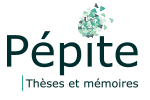Une nouvelle écriture du génocide juif au début des années soixante : Anna Langfus et Piotr Rawicz
A new writing of the jew genocide at the beginning of the sixties : Anna Langfus and Piotr Rawicz
- Anna Langfus
- Piotr Rawicz
- Génocide juif
- Années soixante
- Roman
- Langfus, Anna (1920-1966)
- Rawicz, Piotr (1919-1982)
- Shoah
- Années 1960
- Anna Langfus
- Piotr Rawicz
- Jew genocide
- The sixties
- Novel
- Langue : Français
- Discipline : Langue et littérature françaises
- Identifiant : 2023ULILH021
- Type de thèse : Doctorat
- Date de soutenance : 03/07/2023
Résumé en langue originale
Cette thèse propose de réfléchir sur l'histoire de la littérature de la Shoah, depuis le lendemain de la Libération jusqu'au début des années soixante, et de s'arrêter sur cette période charnière à partir de l'étude des œuvres romanesques d'Anna Langfus et de Piotr Rawicz. En effet, le récit génocidaire de cette décennie voit le jour après une remise en question générique, esthétique et éthique du témoignage immédiat, un constat sur les failles et les limites du langage, ainsi qu'un bouleversement social et historique avec le procès d'Eichmann en 1961. Il s'agira donc de voir comment l'histoire de la littérature de la Shoah, en lien avec l'évolution de la perception de l'Histoire et de la littérature, nous amène progressivement, au début des années soixante, à ce renouveau dans l'écriture du génocide juif. Comment le roman, et ses contraintes fictionnelles, stylistiques, voire poétiques, s'empare de cette partie de l'Histoire et comment, à travers des récits non concentrationnaires et des critères esthétiques et narratologiques déterminés, Anna Langfus et Piotr Rawicz donnent à voir la souffrance juive pendant la Seconde Guerre mondiale, tout en bousculant les attentes testimoniales traditionnelles.
Résumé traduit
This thesis intends to meditate on the history of the literature of the Holocaust, from the day after the Liberation until the beginning of the sixties, and to focus on this pivotal period starting from the study of the fictional works of Anna Langfus and Piotr Rawicz. Indeed, the genocidal narrative of this decade appears after a general, aesthetic and ethical interrogation on the raw testimony of the Jewish genocide, an observation on the flaws and the limits of the language, as well as a political and historical upheaval with the trial of Eichmann in 1961. It will therefore be a question of seeing how the history of Holocaust literature, in connection with the evolution of the perception of History and literature, gradually brings us, at the beginning of the sixties, to this revival in the writings of the Jewish genocide, how the novel, and its fictional, stylistic, even poetic constraints, seize this part of History and how, through non-concentration camp accounts and precise aesthetic criteria, Anna Langfus and Piotr Rawicz draw closer to Jewish suffering during the Second World War, all the while shaking up traditional testimonial expectations.
- Directeur(s) de thèse : Wolf, Nelly
- Président de jury : Chalonge, Florence de
- Membre(s) de jury : Decout, Maxime
- Rapporteur(s) : Sadkowski, Piotr - Mesnard, Philippe
- Laboratoire : Analyses littéraires et histoire de la langue (Villeneuve d'Ascq, Nord)
- École doctorale : École doctorale Sciences de l'homme et de la société (Lille ; 2006-....)
AUTEUR
- Adams, Juliette


